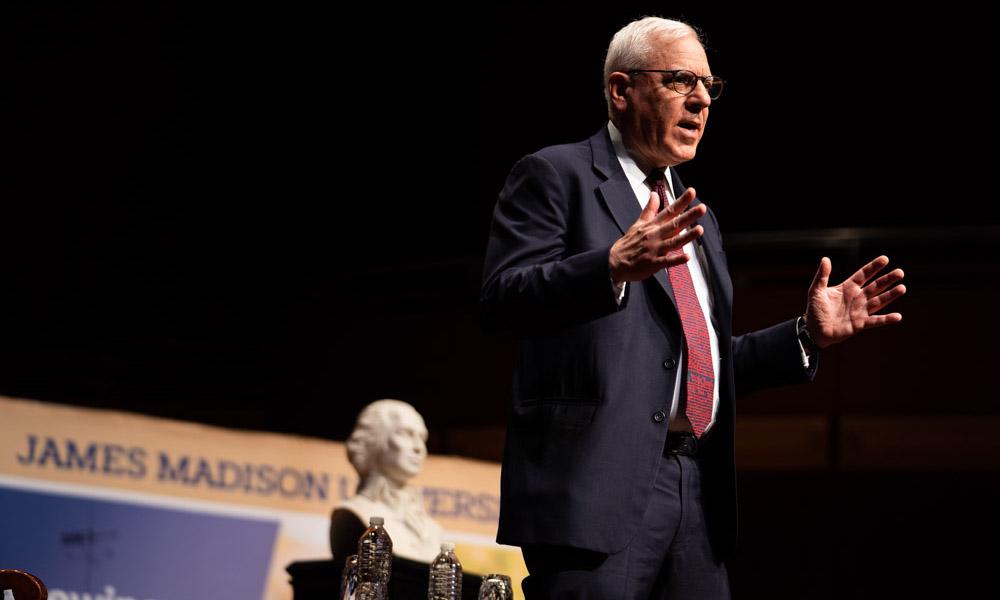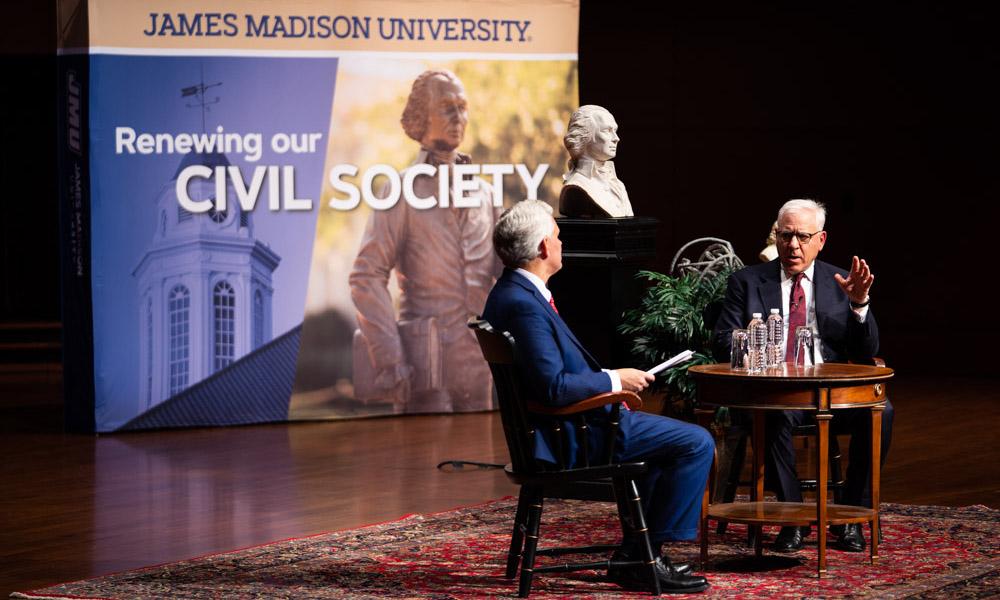Making the case for the Constitution
Nation and World
SUMMARY: Patriotic philanthropist David Rubenstein discusses the importance of the Constitution and of an informed and engaged citizenry.
By Jim Heffernan ('96, '17M)
Why do we not celebrate Constitution Day with the same patriotic fervor that we do Independence Day? Renowned philanthropist David Rubenstein posed this question during the first Madison Vision Series lecture of the 2018-19 academic year.
Although the decision to break away from British rule marked a seminal moment in the history of the United States, “we’re not governed by the Declaration of Independence,” said Rubenstein, recipient of the 2018 James Madison Award for the Public Good.
Rubenstein said that the Constitution, ratified in 1787, provides the framework for the American system of government and has produced a country that is the envy of the world for its basic rights and freedoms, the rule of law and the peaceful transition of power. Despite some egregious omissions in the original document that have since been corrected — including the rights of African-Americans and women — the Constitution has endured for 231 years and serves as a model for fledgling democracies around the world, he said.
“No other organizing document has lasted this long,” he said.
Still, the Constitution and its chief architect, James Madison, are largely unknown to most Americans today, Rubenstein said. Approximately 75 percent of citizens cannot name the three branches of the federal government or even a single justice on the Supreme Court, he said, and more than half do not know the length of terms for U.S. senators and representatives.
|
'People who are more knowledgeable about our government, more knowledgeable about our Constitution, probably are going to be better citizens, vote more intelligently and be more engaged in our country.' |
As alumni of the institution named for James Madison, JMU graduates should have a basic knowledge of the Constitution, he said.
According to Rubenstein, Madison did not succeed in getting everything he wanted in the Constitution, namely state representation in both houses of Congress that was proportional to population, a legislative branch that could veto actions taken by the states and election of the president by popular vote. “Many of the ideas that Madison had were rejected,” he said.
However, Rubenstein argued that Madison deserves the title “Father of the Constitution” for his extensive knowledge of governments and his influence among statesmen, which helped shape debate at the Constitutional Convention; his insistence on a federal government consisting of three branches — executive, legislative and judicial — with a system of checks and balances; and his contributions to the Federalist Papers, in which he, Alexander Hamilton and John Jay argued for a strong central government.
Rubenstein also reflected on Madison’s view of the importance of an informed and engaged citizenry.
“People who are more knowledgeable about our government, more knowledgeable about our Constitution, probably are going to be better citizens, vote more intelligently and be more engaged in our country,” he said.
 |
| JMU President Jonathan R. Alger interviews Rubenstein. |
A patriotic philanthropist whose gifts have helped preserve the heritage of the nation’s founding period, Rubenstein said all Americans, regardless of their socioeconomic status, can give back to society in meaningful ways, including public service. “We can all work together to make the world a better place than we found it,” he said.
Following his lecture in the Concert Hall of the Forbes Center for the Performing Arts, Rubenstein engaged in a conversation with JMU President Jonathan R. Alger about public service and the role of higher education, then fielded questions from audience members on topics ranging from business to philanthropy to leadership.
To watch the full event, click here.
